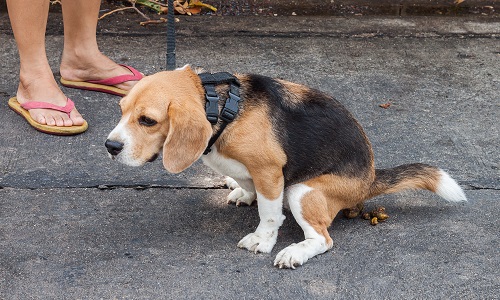What is Acute Colitis?
Acute colitis is a common condition in pets and is characterised by a sudden onset colonic inflammation with a diarrhoea that may contain mucous and/or fresh blood.
Clinical signs
The most common symptoms are straining when defecating, mucous (the jelly you noticed) and/or blood in the stool, and increased frequency of defecation. Systemic signs of illness are generally absent and most animals are still alert, active and have normal appetites in spite of having colitis.
What causes acute colitis?
Various parasitic (like worms), bacterial, fungal and dietary causes can be identified as the cause of acute colitis in animals.
Diagnosis
Firstly a physical examination is performed which includes the vet feeling thoroughly and as deeply as possible without hurting the animals which his or her hands up and down the stomach area (abdominal palpation) as well as physically checking the animal’s backside with their finger (digital rectal examination) and the collection of stool, if there is any present. Parasites like worms can be diagnosed with relative ease by doing a fecal flotation to check for worm eggs under the microscope. The vet may also decide to do what is called a wet prep where a small stool sample is put on a microsope slide and either examined as is or with a special stain and then examined. The main causes of acute colitis in puppies and kittens are dietary indiscretion (garbage), bacterial infections and parasites. Puppies and kittens, the same as human babies, tend to explore the world with their mouths, chewing and biting on many things in their environment, some of which are not always clean or hygienic.
Treatment
If parasites are diagnosed during the faecal examination, the veterinarian will treat your pet with the needed medication to kill the parasites. If a dietary cause for colitis is suspected the veterinarian might start your animal on a bland diet for 3to 5 days. It is best to avoid all treats and food supplements during this period. These diets are highly digestible and reduces the workload on the gastrointestinal tract. Fiber supplementation may also be beneficial in the healing and repair of colonic tissue. Bacterial colitis is best treated with antibiotics based on faecal culture results. The use of probiotics for 3 to 5 days can be beneficial. If an animal fails to respond to therapy based on initial tests, further advanced tests may need to be performed.
Prognosis
The prognosis for discovery from colitis is generally excellent with most animals recovering in a short period of time (3 to 5 days) if the correct treatment is given.
What is chronic colitis?
Chronic colitis is characterised by persistent colonic inflammation for longer than a 3 weeks duration.
What causes chronic colitis in pets?
Middle-aged and older dogs and cats are affected by infiltrative mucosal (the superficial surface of the colon) disorders such as Inflammatory Bowel Disease (IBD) and cancer (neoplasia). Infectious causes (bacteria, worms and parasites) are usually seen in younger dogs and cats, but are less common causes in chronic cases. Some diseases that affect the motility of the colon (e.g. irritable bowel syndrome in dogs and colonic constipation/obstipation in cats) can mimic signs of colonic inflammation and cause animals to present with signs such as loose stools and straining (diarrhoea and tenesmus). These symptoms are due to functional defects in the motility of the colon and there is no mucosal disease present. Colonic cancer can also cause large bowel diarrhoea in dogs.
What are the clinical signs of chronic colitis?
The most classic sign is an animal that keeps trying to pass stool but only passes a very small amount or alternatively no stool. There is continuous straining, many times looking as if something is stuck in the back end which they cannot pass.
If they manage to pass something it may contain mucous and/or blood.
Large bowel diarrhoea is the most common clinical sign noted in dogs and cats where food intolerances are the cause for chronic colitis.
How is chronic colitis diagnosed?
The veterinarian will start off by doing a physical examination, where the abdomen is palpated, a rectal examination performed and a stool sample collected. The stool sample will be examined under a microscope. Abdominal imaging can be done to aid in the examination of the colon and the rest of the abdomen either through X-rays or ultrasound or sometimes both. Advanced diagnostic tests include colonoscopy and proctoscopy. Blood tests may also be performed to determine the extent of infection or to rule out other possible conditions which may present with similar symptoms. During these procedures biopsy samples of the colon can be obtained.
Treatment
The most simple and straight forward approach will be that suspected parasites must be treated. Follow-up faecal examinations are done to confirm efficacy of treatment. If your animal has a more serious condition like Inflammatory Bowel Disease (IBD) which may be related to an immune condition or a diet responsive disorder, a hypoallergenic diet is fed. Animals that do have colitis but don't need a hypoallergenic diet will benefit from being fed a low-fat, fibre rich diet. The vet will be the best person to advise on a suitable therapeutic diet and there is not a one size fits all as some animals need higher fibre whilst other may need a different type of carbohydrate or protein. Antibiotics can be used in cases that have confirmed bacterial causes of colitis. In animals with Inflammatory Bowel Disease (IBD), immunosuppressive drugs are the first choice of drugs for therapy.
Chemotherapy and radiation can be considered for certain colonic cancers, but surgical resection would be the treatment of choice.
Anti-fungal treatment is indicated for chronic colonic diarrhoea of fungal origin.
Prognosis
The prognosis for chronic colitis depends on the underlying cause. Acute bacterial infections tend to have a better prognosis than dietary responsive disorders and normally respond to short term treatment which may resolve the condition completely compared to dietary responsive disorders which tend to require a much longer and more intensive treatment approach where the condition may never be resolved but at the very least contained and managed. Colon cancer, as in humans, carry a much more grave prognosis and the stage and extent of the cancer at the time of making the diagnosis will determine the outcome of treatment.
© 2018 Vetwebsites – The Code Company Trading (Pty) Ltd


